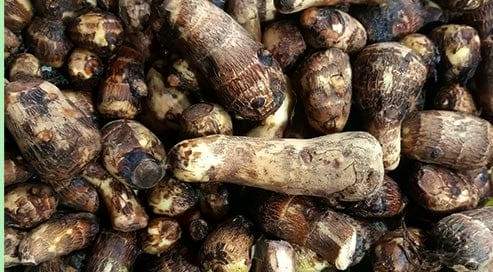Benefits of eating Arbi in winter season; Read to know more

Benefits of eating Arbi in winter season; Read to know more
As winter approaches, the body’s natural defenses against extreme and prolonged cold start to activate. This is an opportune moment to reassess your dietary preferences and consider incorporating more nutritious foods, such as arbi, into your meals.
In Indian households, arbi, also referred to as taro root, is often disregarded despite its numerous benefits. Are you aware that both the leaves and the root, tuber, or corm of arbi are utilized in cooking? Its flavors offer a unique combination of delicate sweetness and deep nutty undertones.
It is not widely known that consuming arbi can provide numerous advantages that one may overlook if they do not include it in their diet. Studies have shown that foods rich in fiber, antioxidants, potassium, magnesium, Vitamin C, and Vitamin E can effectively regulate blood sugar levels and reduce the likelihood of developing cancer and heart disease.
Arbi/Taro Root in Winter: 5 Health Benefits
Arbi, also known as taro root, offers numerous health benefits during the winter season. One of its notable advantages is aiding in weight loss. The high fiber content in arbi keeps you feeling full for a longer period, thereby reducing the overall calorie intake throughout the day. This makes it an excellent addition to a weight loss diet.
Arbi is beneficial for heart health due to its high fiber content that aids in reducing cholesterol levels in the body. Foods containing arbi are free of fat and cholesterol, and it also contains vitamin E, which is essential in preventing cardiovascular issues.
Arbi, a vegetable rich in antioxidants, contains polyphenols primarily composed of quercetin. These compounds derived from plants have the potential to provide protection against life-threatening diseases such as cancer. Additionally, arbi leaves are abundant in beta carotenes and vitamin A, which contribute to overall well-being.
Taro root, also known as arbi, is rich in antioxidants like cryptoxanthin and beta-carotene, which play a crucial role in promoting and improving eye health. By slowing down the aging process of eye cells, these antioxidants effectively prevent the development of cataracts and macular degeneration.
Arbi, a popular low-glycemic meal, is effective in managing diabetes by slowing down the liver’s breakdown of glucose. Moreover, it contains resistant starch, which is not easily absorbed or digested, further contributing to the gradual increase in blood sugar levels after a meal.
The composition of this product comprises of essential nutrients such as Vitamin B6, Vitamin E, phosphorous, magnesium, and more.










